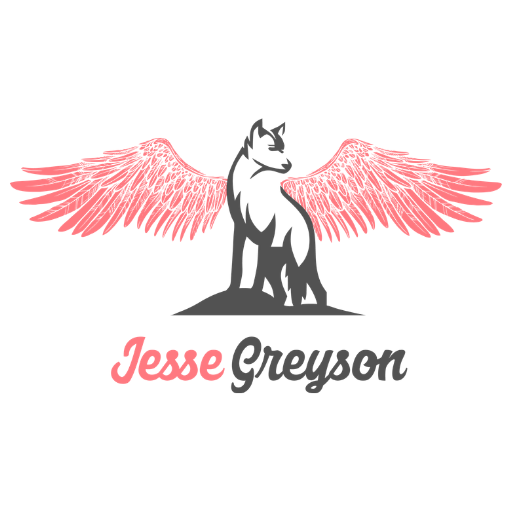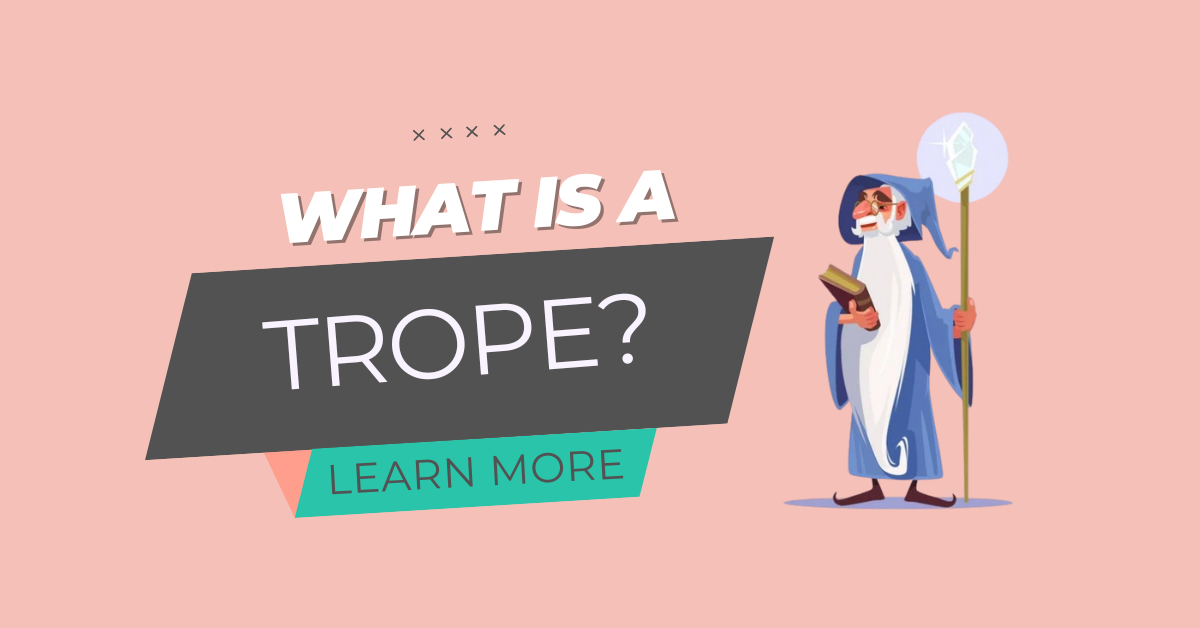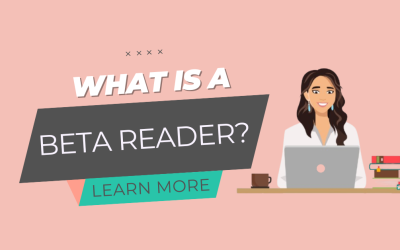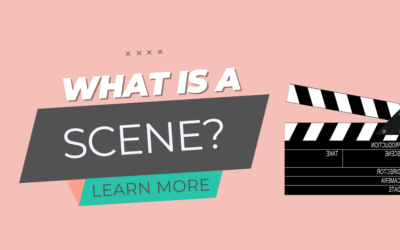A trope is a storytelling element that has been used so many times that it has become a convention.
The term trope is used broadly and can cover aspects of storytelling such as figures of speech (e.g. ‘let’s go kick some ass’), imagery (e.g. a human rising through the air toward a UFO), character (e.g. the jaded cop two weeks from retirement) or plot structure ( e.g. the ‘chosen one’ teenager who saves the world while choosing between two love interests). It is a recognisable plot element, theme, visual or verbal cue that conveys something to the reader.
What has been will be again, what has been done will be done again; there is nothing new under the sun.
Ecclesiastes 1:9 NIV

Are Tropes Bad?
Tropes aren’t inherently bad. They exist because they work. In fact, it is nigh impossible to write a story without them.
Tropes function as shorthand, conveying a wealth of information to the reader in a few short words or images.
Tropes in writing become a problem when they have been overdone and the writer has brought nothing new to them.
An over-reliance on tropes is considered a sign of poor writing, lazy writing, and a lack of originality.
When using tropes, it is important to use them within intention. That is, to know what they are and how they function within your genre.
You can then either double down on them, leaning into all their tropely glory, confident that they are serving the type of story you want to tell. Or, you can know they are there and intend to up-end them or put a fresh spin on them in some way.
Be warned though, subverting tropes can backfire on you if you don’t manage your readers’ expectations appropriately.
How Do I Use Tropes To Manage A Readers Expectations?
People read to experience a desired set of emotions.
We read because we want to FEEL a certain way.
Plot tropes are a form of shorthand which let us know which feelings to expect when we pick up certain books. For example, a fantasy reader is usually seeking a sense of wonder and heroism, a thriller reader is seeking a feeling of intrigue, tension and suspense, and a romance reader is seeking a feeling of squee. Yes, squee. It’s a real word and everything.
Common plot tropes include but are by no means limited to: the buddy cop story, the underdog story, the rags-to-riches story, the happily-ever-after story, the whodunnit story, the quest story, the romance story and the comedy.
When we select books with these plots we know, for the most part, what to expect from them.
And we’re okay with that. In fact, that’s why we chose them.
People read genre fiction because they want to go on a familiar emotional journey. At the same time, they are expecting the author to make that familiar journey feel fresh and new to them in some way.
No pressure authors
People read genre fiction to experience a familiar set of emotions
The Perils Of Subverting Tropes
If you choose to subvert the tropes in your book you need to foreshadow this on the cover, the back cover blurb and in the first chapters, otherwise, the majority of your readers will feel tricked and betrayed when their happily-ever-after story (in which they were hoping to feel squee) turns into a tense thriller story.
Conversely, your thriller readers will feel disgruntled and let down if your edge-of-your-seat thriller turns into a mushy romance halfway through.
Sure, some of your readers will love the subversion, but they will be the exception and not the rule.
By and large, you will alienate your audience – unless you managed their expectations of the story from the very beginning.
(Spoilers ahead)
A great movie example of this is Hancock. It starts out as a fresh take on the superhero trope featuring an alcoholic and down-on-his-luck Will Smith. The story is captivating and interesting until they introduce his superhero ex-girlfriend, Charlize Theron.
From there on the story shifts from superhero movie into a ‘romance of the ages,’ completely losing any tension it had. As a general consensus, the movie alienated both romance movie lovers and superhero movie lovers.
For a literary example, Dan Wells often cites the number one complaint with his ‘I Am Not A Serial Killer’ book, is that he left it too long to introduce the supernatural element in the story. This had the dual effect of:
- Not capturing the interest of readers who WANTED that paranormal aspect in a story, and
- Alienating readers who thought they were reading a standard crime thriller when suddenly it turned paranormal.
So again, be aware of the tropes in your story and of how you are using them.
What’s The Difference Between A Trope And An Archetype?
The difference between the two is the timelessness and universality of their natures. Tropes are dependent on the time period and the culture they exist in, whereas archetypes are concepts that are universal across all ages of civilisation and cultures.
Within the framework of storytelling, an archetype is a common pattern of behaviour or a representation of a universal truth. For instance – the mentor character has a common pattern of behaviour, while ‘love is the answer’ is considered a common universal ‘truth.’
Due to its persuasive and universal nature, an archetype never becomes stale or dated. Although they can feel one dimensional unless the writer fleshes them out and put their own unique spin on them.
You can have a mentor character archetype, but what makes your mentor character different from every other mentor character out there?
The 12 main archetypes common across all time periods and cultures
What Are Some Of The Most Common Tropes In General Fiction?
There are some catchall tropes that everyone is familiar with:
- Idiot plotting – wherein the stories problems could easily be resolved if the two main characters just talked to each other, yet don’t for a variety of flimsy reasons
- The dark lord who wants to take over and destroy the whole world/universe
- The ‘everyman’ character who rises to the occasion and saves the day/world
- The two lead characters getting together at the end of the story,
- The bad guy/monster we thought was dead rising again when the main characters back are turned.
What Are Some Common Tropes Found In Genre Fiction?
Action Books & Movies
The chase scene: A frantic pursuit between two parties, either on foot or with vehicles.
The ass-kicking pose: As the team prepares to fight, they all simultaneously adopt the ‘ass-kicking pose’ and pause, looking cool
The just-in-time-object-catch: The hero dives for, and catches an object that absolutely must not strike the floor, just before it hits the ground
Romance Books & Movies
Arranged Marriage: A common technique in historicals to force the hero and heroine to deal with each other.
Anti-Hero: The types vary, but romance novel leads can tend towards bad boys (ready to be reformed) instead of a clean-cut, straitlaced fellow.
Broken Bird: Women love to see the healing power of love. Most have a side of Intimate Healing as well, but usually after the hero is a bit less screwed up.
Speculative Fiction Books & Movies
(Fantasy) The power to create something from nothing: the character makes something out of thin air, or, more accurately, nothing.
(Sci-fi) The lightspeed leapfrog: The brave explorers set out in their spaceship to spread humankind to the stars. You can’t travel faster than light, so they’re going to spend most of the trip on a Sleeper Starship as Human Popsicles, or it’s a Generation Ship and it’ll be their descendants who step out at the other end of the trip.
(Fairy tales) The impossible task: a favourite in myths and folklore and the world over. The task might be undertaken to win a boon, or a bride, to gain land, to break a Curse
Thriller Books & Movies
The cliff hanger: often thought of as a cheap and lazy way to create a sense of suspense. A Cliff-hanger ends a scene, chapter or book with some (or all) of the main characters in peril of some kind and the audience is made to wait for the outcome.
The conspiracy: The story starts off with either a minor meaningless crime or a high-profile murder. A person related to the criminal blamed or the uncovered victim notices some odd discrepancies in the official story and digs deeper. Before the protagonist(s) realize(s) it, they are caught in a multi-layered plot.
The reveal: A key moment in most plots, when the heroes or the audience discover how the villains have been manipulating everyone. Can also be used to make a cliff-hanger more dramatic.
Here’s Even More Examples Of Tropes! They’re Everywhere!
Mixing The Familiar And The Strange. Making Tropes Your Own
There is a reason that most speculative fiction stories usually consist of 70% the known world and 30% the strange.
If I wrote of an experience that was wholly new in all of human existence, it would be so foreign and incomprehensible to the human mind as to be meaningless.
Without a framework of familiarity to reference, any wholly new thing or experience cannot be thought of, understood, discussed, or shared.
This same principle applies to storytelling. We need tropes to understand the framework of the story. The secret to fresh storytelling lies in taking those familiar tropes and twisting them just enough to make them interesting and unique while keeping them relatable.
Summary
As always when it comes to the craft of writing, the most important thing is to KNOW what the tools are, UNDERSTAND how they impact story and then to use them WITH INTENTION.
Tropes aren’t inherently bad, and there is nothing wrong with writing the most tropetastic story in existence (hello The Witcher), AS LONG AS YOU DO IT INTENTIONALLY, and not by default through lazy or ignorant writing.
So go, know thy tropes, and wield those tropes with devastating intention.
Happy creating,
Jesse xx





0 Comments